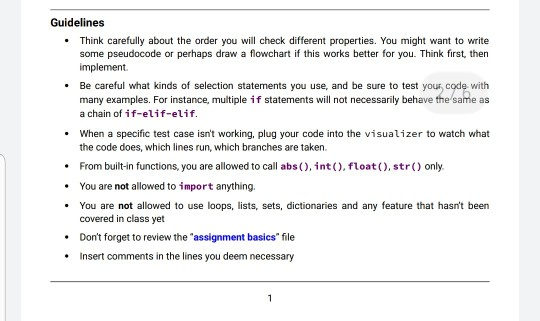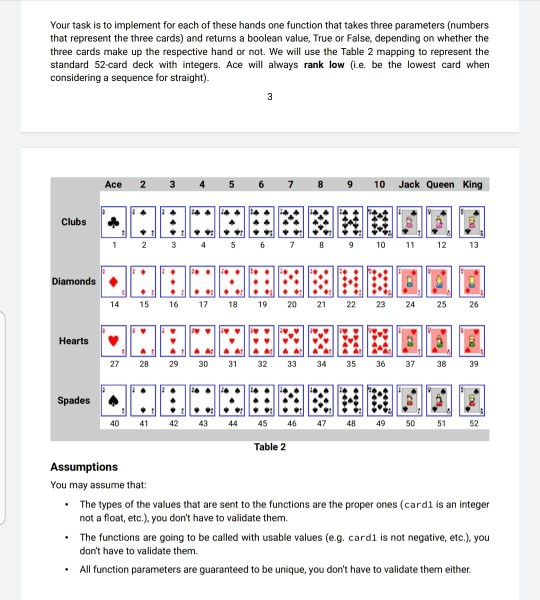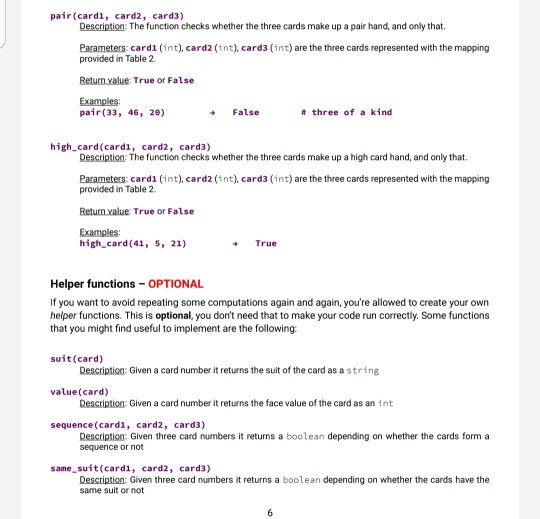Answered step by step
Verified Expert Solution
Question
1 Approved Answer
python function that gets a pair or a high card Guidelines Think carefully about the order you will check different properties. You might want to



python function that gets a pair or a high card
Guidelines Think carefully about the order you will check different properties. You might want to write some pseudocode or perhaps draw a flowchart if this works better for you. Think first, then implement Be careful what kinds of selection statements you use, and be sure to test your code with many examples. For instance, multiple if statements will not necessarily behave the same as a chain of if-elif-elif. When a specific test case isn't working, plug your code into the visualizer to watch what the code does, which lines run, which branches are taken. From built-in functions, you are allowed to call abs(), int(), float(), str() only You are not allowed to import anything. You are not allowed to use loops, lists, sets, dictionaries and any feature that hasn't been covered in class yet Don't forget to review the "assignment basics" file Insert comments in the lines you deem necessary Your task is to implement for each of these hands one function that takes three parameters (numbers that represent the three cards) and returns a boolean value. True or False, depending on whether the three cards make up the respective hand or not. We will use the Table 2 mapping to represent the standard 52 card deck with integers. Ace will always rank low i.e. be the lowest card when considering a sequence for straight) Ace 2 3 4 5 6 7 8 9 10 Jack Queen King 2 3 4 5 6 7 8 9 10 11 12 Diamonds 14 15 16 17 18 19 20 21 22 23 24 25 Hearts Het ERREPIK22. 27 28 29 30 31 32 33 34 35 36 37 38 Spades 40 41 42 43 44 45 46 47 48 49 50 51 Table 2 Assumptions You may assume that: The types of the values that are sent to the functions are the proper ones (cardi is an integer not a float, etc.), you don't have to validate them. The functions are going to be called with usable values (e.g. cardi is not negative, etc.). you don't have to validate them. All function parameters are guaranteed to be unique, you don't have to validate them either. pair(cardi, card2, card3) Description: The function checks whether the three cards make up a pair hand, and only that, Parameters cardi (int), card2 (int), card (int) are the three cards represented with the mapping provided in Table 2 Return value True or False Examples pair (33, 46, 20) False three of a kind high_card(cardi, card2, card3) Description: The function checks whether the three cards make up a high card hand, and only that Parameters cardi(int), card2 (int), card3 (int) are the three cards represented with the mapping provided in Table 2 Return value True or False Examples: high_card(41, 5, 21) True Helper functions - OPTIONAL If you want to avoid repeating some computations again and again, you're allowed to create your own helper functions. This is optional, you don't need that to make your code run correctly. Some functions that you might find useful to implement are the following suit(card) Description: Given a card number it returns the suit of the card as a string value(card) Description: Given a card number it returns the face value of the card as an int sequence (cardi, card2, card3) Description: Given three card numbers it returns a boolean depending on whether the cards forma sequence or not same suit(cardi, card2, card3) Description: Given three card numbers it returns a boolean depending on whether the cards have the same suit or notStep by Step Solution
There are 3 Steps involved in it
Step: 1

Get Instant Access to Expert-Tailored Solutions
See step-by-step solutions with expert insights and AI powered tools for academic success
Step: 2

Step: 3

Ace Your Homework with AI
Get the answers you need in no time with our AI-driven, step-by-step assistance
Get Started


